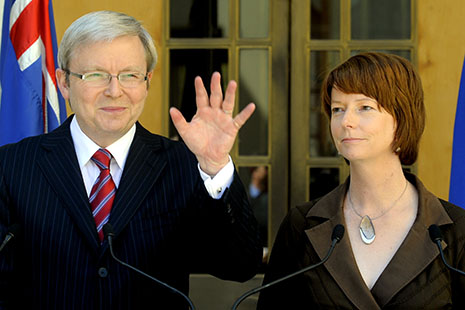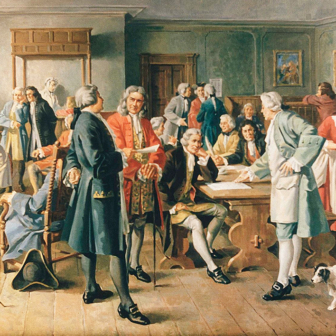THE SIMPLE explanation for Kevin Rudd’s abrupt demise is that he lost the confidence of his most important constituency – his party. But there is no simple explanation for how that came about. Indeed, it stems from multiple causes, many of them related to his own personality.
For starters, he never really understood the party. Political parties are complex entities where tradition, idealism, pragmatism, ruthlessness and ambition all co-exist in a volatile combination. Simply refusing to recognise the factions, as Rudd did, is to indulge in political fantasy: just because he wished them out of existence did not mean that they vanished. Despite its increasingly presidential style of campaigning under a leader’s banner, the Labor Party remains strongly collective in its orientation. Someone with a control obsession was always bound to come into collision with the party’s core, which is essentially tribal.
Nor did he understand that support cannot be taken for granted, and there is no evidence that he ever sought to build a base within a party he was in but not of. He had no network to fall back on and, as became clear when his star started to lose its lustre, when he stumbled no one was going to stoop to pick him up; certainly, no one was prepared to die in the ditch for him.
And part of the reason for Rudd’s sudden fall might lie in the gradual revelation that the cartoon superhero role of Kevin07 couldn’t be filled, that the man who was given the part was really only mortal.
The 2007 election – the Kevin07 election – is still fresh in our minds. We had tired of Howard; he was visibly ageing, as was the government he led. Kevin Rudd, by contrast, radiated freshness and energy; here was the new, improved, modernised product to replace the old, tired and worn-out one, or so said the very slick advertising campaign, backed up by morning television chat show appearances.
Now, some three years down the track from the campaign that delivered Australia only the third change of government in a quarter of a century, that product has faded with use; the deft touch that characterised its introduction has faltered.
Kevin07 – with its unsubtle nod towards James Bond – was, like most advertising campaigns, based on unsustainable hyperbole. The superhero outfit carefully crafted from focus-group feedback and strategic polling began to look a size too big for the man who wore it, which rather prompts the question of whether the promises were all too cute by half. Did the advertising extravaganza raise expectations too high? It is, after all, one thing for a party not to fulfil all its election promises; but with the increasingly presidential election campaigns we now have, the exclusive focus on the leader, promises become personal commitments which, if unfulfilled, quickly translate into personal failings.
To be fair, Kevin Rudd was little known before being thrust into the Labor leadership less than a year before the election. You have to go back to John Gorton, the accidental prime minister plucked from obscurity to succeed the hapless Harold Holt when he drowned just before Christmas 1967, to find a leader so unfamiliar to voters on assuming office.
John Howard was a fixture in the political landscape by the time he won government in 1996; Paul Keating, the saturnine treasurer who worked the engine room for Bob Hawke, had been highly visible for the best part of a decade before he succeeded Hawke at the end of 1991; and Hawke himself was a public figure long before he entered parliament in 1980. Before Hawke, Malcolm Fraser had trod the public stage for many years before bending the rules and winning office by burglary in 1975; Gough Whitlam, in opposition a larger-than-life combatant, needed no introduction when he won in 1972; and Billy McMahon had been a minister for two decades before he became prime minister in 1971.
And that brings us back to John Gorton, a maverick in a conformist party; a man of fiat and impulse who quickly squandered the goodwill of his party and lost so much ground with the electorate in 1969 (admittedly with an unrealistically inflated majority from 1966) that he created the conditions for Whitlam to win three years later. The job, it turned out, was way too big for him.
Curiously, however, public affection for Gorton – the battle-scarred former fighter pilot widely known as Jolly John – remained as his party turned against him. For all his limitations, he exuded a warmth that Rudd lacks. There was a perceptible distance between Rudd and the people, and last year’s brief and risible foray into the vernacular served merely to highlight this.
Kevin Rudd, it needs to be said, was no Gorton. He was cautious where Gorton was mercurial, even reckless. Yet there are two compelling similarities: both came into the top job as virtual unknowns and both were political loners. Gorton had no real power base in the Liberal Party other than a coterie who promoted his cause for their own benefit as much as his. Rudd owed his promotion to having been seen as the only available option when Kim Beazley fell on his sword after Labor’s long and uninspiring years in the wilderness under Beazley, Simon Crean, Mark Latham and Beazley again. When Gorton began to slip, no one propped him up, just as Rudd was left to fall.
Labor Party leadership is now every bit as instrumental as in the Liberal Party: its occupant is safe only so long as he or she is seen as capable of either winning or retaining office. Gone now is the romantic loyalty that once kept serial losers like Bert Evatt and Arthur Calwell in the leadership. Even Hawke’s record of four election wins was not enough to preserve his leadership amid fears of losing the next election as his popularity waned.
WHAT about Rudd as leader? John Howard in many ways was a good leader. He built a team around him that was exceptionally loyal, cabinet leaks were all but non-existent, his authority in the party was unchallenged and, above all, he went out and did the leadership stuff - he sold policy.
Howard let his ministers run their departments, and that freed him up to do the big picture stuff, which he was good at it. Rudd’s absorption in micromanagement verged on the obsessive. He could master detail, as a former bureaucrat should, but where was the big stuff? Where was the broader sense of movement? Where was the generalship we look for in a leader, the vision splendid? All too often, from speeches in parliament to interrogations by the ABC’s Kerry O’Brien, we saw the bright boy with the answers, the glib technocrat on top of his brief. But to what end? Where were we going? How were we getting there? His abrupt walk away from the emissions trading scheme was never explained; it smacked of a fit of pique. His ratings from that point headed quickly south.
He was both eloquent and statesmanlike in his apology to the stolen generation, yet momentum from that apogee was strangely lacking. The Kevin Rudd that stood tall and spoke those memorable words is already fading, like a sepia photo in a family album. We have to peer closely to remember the features.
Was it, perhaps, that the Liberal Party’s own infighting after its loss in 2007 gave him a free ride for a time? Did he look so much better because Brendan Nelson and Malcolm Turnbull really weren’t fighting him? Tony Abbott is a much more formidable contender, yet we did not see Rudd adjust his approach to deal with this dynamic and fast-moving political streetfighter. Was he, perhaps, too inflexible to change? Just as Rudd made Howard look wooden, so too has Abbott made Rudd look far less certain, far less in command.
Rudd came into office with an enormous amount of party goodwill, and why not? He had delivered victory for the party after eleven years of defeat and humiliation. He was given power, unlike any Labor leader before him, to select his own cabinet.
John Gorton enjoyed a similar elevation, bringing a relaxed informality to the job which was seen, at least for a while, as being in tune with the times. But the longer Gorton remained in power the more enemies he made. His centralist tendencies made powerful enemies within the state divisions of his own party, especially in Victoria and New South Wales; he seemed incapable of mending damaged fences, and nor did he see any reason to.
Power within the ALP is widely dispersed and a leader needs a coalition of forces on his side, but Rudd slowly alienated powerful groups such as the NSW Right, as much by his style as by his actions. And this goes back to his lack of understanding of the Labor Party
We never quite got to know Kevin from Queensland – the actor lucky enough to score a role as Kevin07, but who never quite managed to establish the character. •




